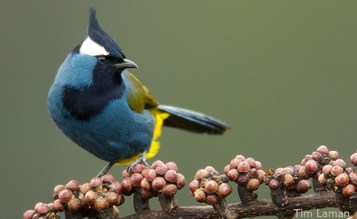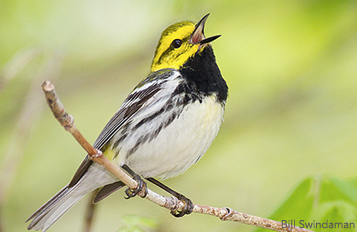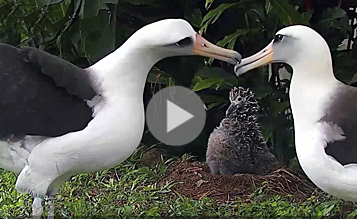Young Albatrosses Practice Their Courtship Moves on Camera
On a recent afternoon on Kauai, Hawaii, our Laysan Albatross cam caught an amazing moment of natural history when three young-adult albatrosses visited the month-old chick (named Kaloakulua). The young birds are between about 3 and 7 years old. They have no nests of their own and are just starting to learn their elaborate courtship dance—and this afternoon they decided to practice on camera. It’s a bewildering, sometimes ear-splitting set of head-bobbing, bill-clacking, whinnying, moaning, preening, and nuzzling. Watch this remarkable highlight clip.
Heads-Up for Hawks! Fans of Big Red and Ezra should keep a lookout on our Red-tailed Hawk cam this month, as the two birds have been visiting last year’s nest site regularly (see sidebar). Last year they laid their first egg March 14—they could lay this year’s first egg any day.

Crested Berrypecker, a species of high-elevation forests in New Guinea, by Tim Laman.
Two New Studies Find Birds Shifting Ranges Due to Warming Temperatures
As the planet warms, scientists are striving to learn how the changes—gradual by human standards, abrupt in evolutionary terms—are affecting the complex interrelationships of nature. Birds are very mobile animals, and they’re some of the first to show changes. Two Cornell Lab studies—one on the familiar Carolina and Black-capped Chickadees, the other an arduous expedition to remote New Guinea—found similar results: species are moving their ranges farther north and higher up mountains as the average temperature climbs. Read the chickadee story and the New Guinea story.

Learn Bird Sounds With These Smartphone Apps
As we inch toward spring and the return of dawn choruses, it’s a good time to brush up on bird calls. But with more than a dozen iPhone apps out there, which one will make bird sounds easiest to learn? We put the apps through their paces and we’ve got some recommendations for you, including stats, tips, plus suggestions for Android users and folks without smartphones. Read our full review.
More Ways to Improve Your Birding:
Attention Educators: Check Out These Resources
Save on New Curriculum Kit: Our BirdSleuth program creates curriculum kits that use birds and inquiry in the outdoors to meet national science standards. They’re a great way to make sure kids are active and interested. Our newest kit, Habitat Connections, is now 20 percent off in our store. Get the details.
How a Bird Sings With Its Wings:Discover the Club-winged Manakin, a bird that makes a remarkable, high-pitched hum in one of the strangest ways imaginable. Dr. Kim Bostwick discovered the secret over the course of many years, using experiments and high-speed video, and her website tells the story in fascinating detail and great video.
The Ordinary Extraordinary Junco is a series of free, short videos and teacher resources produced by scientists at Indiana University. They’ve studied the birds for decades, and their excellent videos cover myriad science-standards-related topics.
|





